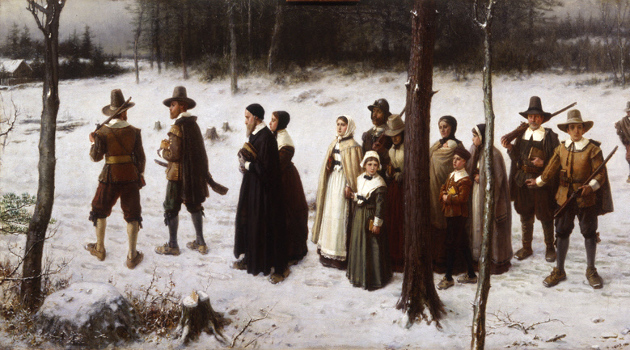By global standards, the United States is a bulwark of capitalism. Yes, government is too big and there’s far too much intervention, but we have enough private property and free enterprise to be ranked #5 for economic liberty. Which helps to explain why Americans enjoy higher living standards than Europeans.
But capitalism had to be learned. One of the first European settlements in North America, the Plymouth Plantation in Massachusetts, was based on socialism.
And it was real socialism, with common ownership of the means of production.
Unsurprisingly, it was not a rousing success. Indeed, it was a miserable failure.
Here’s Larry Reed’s analysis of what happened.
We should never forget that the Plymouth colony was headed straight for oblivion under a communal, socialist plan… Land was held in common. Crops were brought to a common storehouse and distributed equally. For two years, every person had to work for everybody else (the community), not for themselves as individuals or families.
Did they live happily ever after in this socialist utopia? Hardly. The “common property” approach killed off about half the settlers. Governor Bradford recorded in his diary that everybody was happy to claim their equal share of production, but production only shrank. Slackers showed up late for work in the fields, and the hard workers resented it. …The disincentives of the socialist scheme bred impoverishment and conflict until, facing starvation and extinction, Bradford altered the system. He divided common property into private plots… Communal socialist failure was transformed into private property/capitalist success, something that’s happened so often historically it’s almost monotonous.
And here are some excerpts from a column that Professor Ben Powell wrote back in 2004.
Bad weather or lack of farming knowledge did not cause the pilgrims’ shortages. Bad economic incentives did. In 1620 Plymouth Plantation was founded with a system of communal property rights. Food and supplies were held in common and then distributed based on “equality” and “need” as determined by Plantation officials. People received the same rations whether or not they contributed
to producing the food, and residents were forbidden from producing their own food. …Because of the poor incentives, little food was produced. Faced with potential starvation in the spring of 1623, the colony decided to implement a new economic system. Every family was assigned a private parcel of land. They could then keep all they grew for themselves, but now they alone were responsible for feeding themselves. …This change, Bradford wrote, “had very good success, for it made all hands very industrious, so as much more corn was planted than otherwise would have been.” Giving people economic incentives changed their behavior. …Once the Pilgrims in the Plymouth Plantation abandoned their communal economic system and adopted one with greater individual property rights, they never again faced the starvation and food shortages of the first three years.
By the way, the settlement in Jamestown, Virginia, also had a very unsuccessful experiment with socialism.
Every Thanksgiving, I like to remind people about America’s failed experiment with big government.
This year, I want to build on that history lesson by looking at how capitalism’s invisible hand is making our modern holidays ever-more affordable.
We’ll start with Mark Perry of the American Enterprise Institute, who explains how free enterprise makes Thanksgiving possible.
…most of you probably didn’t call your local supermarket ahead of time and order a Thanksgiving turkey this year. Why not? Because you automatically assumed that a turkey would be there when you showed up, and it probably was there when you appeared “unannounced” at your local grocery store and selected your Thanksgiving bird.
Or it will be there…when you “skip the trip” to the grocery store and get free 2-hour delivery from Amazon Prime Now… The reason your Thanksgiving turkey was waiting for you without an advance order? Because of the economic concepts of “spontaneous order,” “self-interest,” and the “invisible hand” of the free market. Turkeys appeared in your local grocery stores primarily because of the “self-interest” (greed?) of thousands of turkey farmers, truck drivers, and supermarket owners and employees who are complete strangers to you and your family. But all of those strangers throughout the turkey supply chain co-operated on your behalf and were led by the “invisible hand” to make sure your family had a turkey (or two) on the table to celebrate Thanksgiving.
By the way, just imagine what would happen if a government bureaucracy (like the Department of Agriculture) was in charge of Thanksgiving. Everything would cost more and have lower quality.
And the entire experience would be like a trip to the Department of Motor Vehicles.
But this isn’t just a story about how food appears on store shelves because of market forces rather than central planning.
It’s also a story about the competitive forces of capitalism make that food ever-more affordable. As shown in this chart from Marian Tupy of Human Progress, the cost of a Thanksgiving dinner is dropping over time.
But even that’s not the full story.
We’re also getting richer over time thanks to free enterprise.
So the amount of work that is required to buy Thanksgiving dinner is falling even faster. Here’s a chart from Mark Perry.
Now you know what to be thankful for.
P.S. I embedded a couple of humorous anti-libertarian memes in the column. If you want some more Thanksgiving-themed humor, you can click here and here for some mockery of Obama. And here’s a satirical look at a future Thanksgiving in a nation controlled by our friends on the left.
———
Image credit: "Pilgrims Going To Church" | Public Domain.



